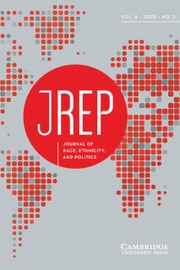No CrossRef data available.
Article contents
Ethnic-Racial Socialization in White American Families and Young Adult Political Attitudes
Published online by Cambridge University Press: 13 March 2024
Abstract
The United States is in a time of reckoning with whiteness. Despite white people benefiting from a disproportionate amount of power at every level of government, a significant racial wealth gap, preferential treatment in the legal system, and a rise in white supremacy, “colorblind” critics continue to argue against the relevance of race in a purportedly post-racial society. We assert that parents’ ethnic-racial socialization (ERS) of their children shapes how children view their racial identity and thus influence important political attitudes. ERS is a process by which individuals are taught values, beliefs, and attitudes about ethnicity and race. Most existing research among families of color suggests ERS is strongly linked to a variety of adult political attitudes. However, less is known about the impact of ERS on political attitudes for white young adults. Drawing on survey data from a national U.S. sample of 944 white, young adults (18–25 years old), we find that white ERS is linked with political attitudes. Specifically, we find that increased cultural socialization, preparation for bias, and egalitarianism are positively related to politically conservative ideology, while anti-racism is positively related to politically liberal ideology. Preparation for bias and egalitarianism are positively related to Republican party identification. Promotion of mistrust, silent racial socialization, and anti-racism are positively related to Democratic party affiliation. We suggest ERS impacts the way a person conceptualizes ethnicity and race and is inextricably linked to political outcomes.
Keywords
- Type
- Research Article
- Information
- Copyright
- © The Author(s), 2024. Published by Cambridge University Press on behalf of the Race, Ethnicity, and Politics Section of the American Political Science Association




